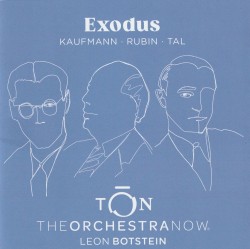 Exodus
Exodus
The Orchestra Now; Leon Botstein
Avie Records AV2713 (avie-records.com/releases/exodus-walter-kaufmann-•-marcel-rubin-•-josef-tal)
During the 1930s, some Jews able to make their own “exoduses” fled Nazism, including the composers on this CD: Walter Kaufmann (1907-1984) went to India, Marcel Rubin (1905-1995) to France, Josef Tal (1910-2008) to Palestine.
Recognition of Kaufmann has accelerated since my September 2020 WholeNote review of Kaufmann’s debut CD by Toronto’s ARC Ensemble. In the June 2024 WholeNote I reviewed the first CD of his orchestral works, praising his Indian Symphony (1943) for its “soulful woodwind solos, pulsating strings, dramatic brass and percussion.” Here’s a second recording of that symphony. At 17:32, nearly two minutes longer than the previous recording, conductor Leon Botstein’s performance enhances the music’s exotic atmosphere and grandeur.
Conceived during wartime, Rubin’s powerful, 34-minute Symphony No.4 “Dies Irae” (1945, rev.1972) was revised when the disillusioned Rubin, reacting to contemporary events, replaced two optimistic movements with the grim Pastorale. The dirge-like opening Kinderkreuzzug 1939 takes its title from Bertolt Brecht’s poem (included in the booklet) describing “lost children” fleeing “the nightmare.” The four-note motto of the medieval Day of Wrath chant dominates the second movement’s sardonic march; the chant then underlines the Pastorale’s passacaglia, wandering through painful memories before ending meditatively.
Tal’s 23-minute Exodus (1947), composed during the outbreak of hostilities prior to the UN’s establishment of Israel, employs biblical verses from Exodus and Psalms, emphatically sung in Hebrew by brawny-voiced baritone Noam Heinz. Botstein and The Orchestra Now generate brilliantly-coloured sonorities from Tal’s “Hollywood epic”-style score.



